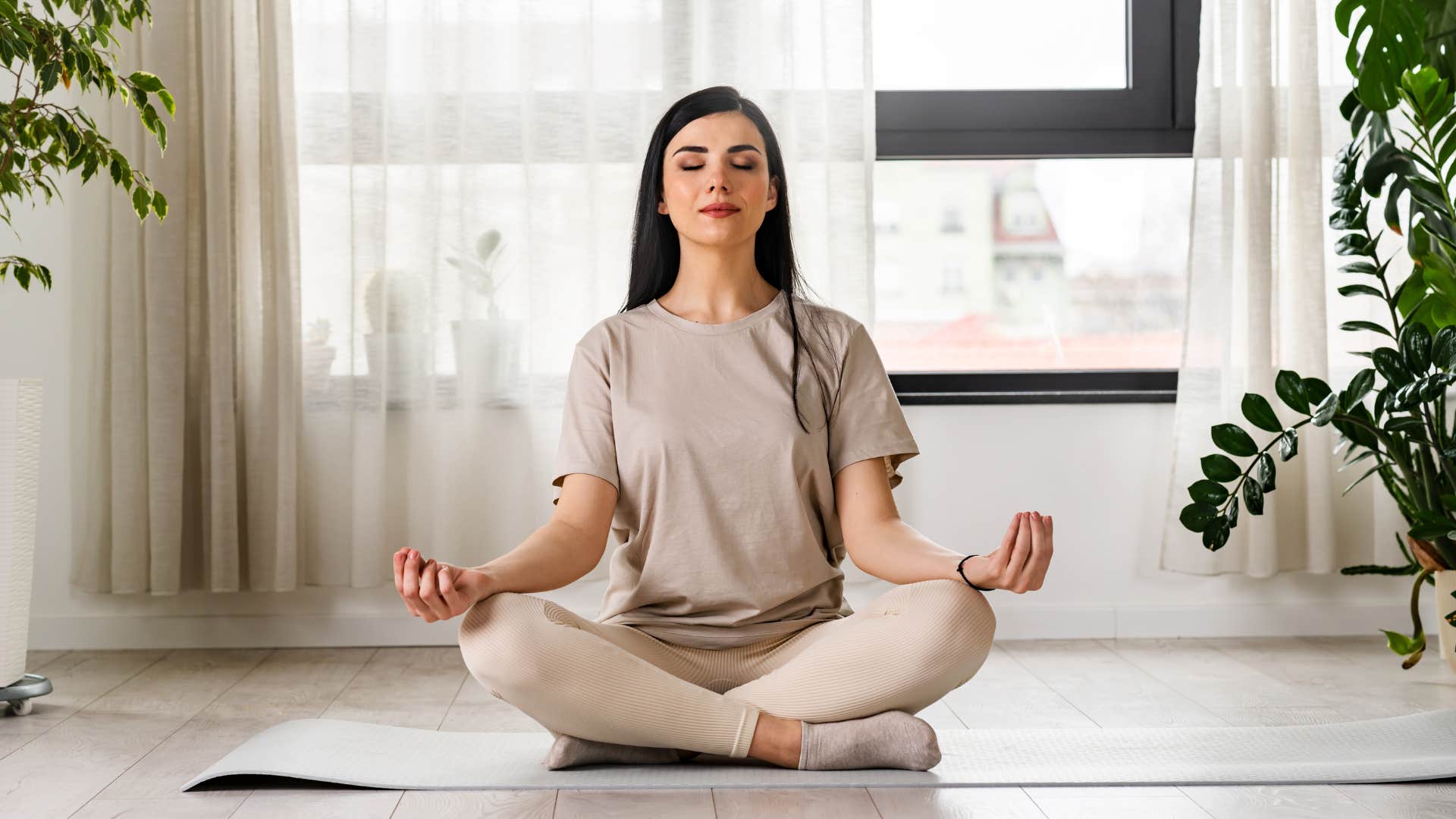11 Things People Who Prefer Solitude Secretly Love About Being Alone
Being alone doesn't mean you're lonely.
 Kateryna Onyshchuk / Shutterstock
Kateryna Onyshchuk / Shutterstock Solitude is often misunderstood and mistaken for loneliness when in reality, it's that people just love being in their own company. They don't shun connection, but they do take time to recuperate after social interactions that take up too much energy. In these moments of solitude, they reconnect with themselves, away from the noise of distractions.
What people don't see are the deeply satisfying and joyful aspects of being alone that solitude-lovers cherish. From creative freedom to feeling at ease knowing that the societal pressure is off of them to behave a certain way. These hidden pleasures are overlooked but those who thrive in solitude know they make all the difference.
Here are 11 things people who prefer solitude secretly love about being alone
1. It gives them the mental clarity they need
 Lordn | Shutterstock
Lordn | Shutterstock
People who prefer their solitude find that being alone provides the mental clarity that they desperately crave. Away from the noise, they find that their thoughts can finally settle down and can now process their emotions in silence. This allows them to reflect on what has transpired early that day and how to better address it the next time it happens.
Solitude can enhance emotional regulation and self-awareness. A study published by Scientific Reports found that voluntarily spending more time alone was linked to reduced stress and increased feelings of autonomy. The more freedom a person has the less likely they are to conform to societal expectations.
2. No social pressure from the outside world
 New Africa | Shutterstock
New Africa | Shutterstock
They secretly cherish the freedom from social pressure that being alone provides them. No more buzzing of others' expectations in their ears. There's liberation in not having to engage in small talk or group dynamics anymore. Just being alone with their own thoughts in their most comfortable space. This space was curated to their liking so that they could be at peace with judgment from others.
As Arthur Dobrin D.S.W., explains that people desire to be accepted by others at the expense of personal accuracy. They conform to societal pressures rather than follow their instincts. For people who love solitude this is rarely an issue as they do what they want and do not participate in conformity. If they are called weird for wanting to be alone then they embrace the truth.
3. A deep focus
 Jelena Zelen | Shutterstock
Jelena Zelen | Shutterstock
When people are alone, they tend to focus deeply on other things that they need to get done. This is the benefit that people who prefer solitude secretly love. There is no constant demand for attention, but a clear space where their concentration sharpens. This depth of focus can lead to fulfillment as they fully immerse themselves in what matters the most.
Embracing solitude can not only lead to better focus but also a pathway to better physical and mental health. A study published by Frontiers showed that people who found comfort in spending time alone saw lower levels of depression, fewer physical illnesses, and a greater overall life satisfaction. Solitude lovers take pride in their healthy minds and bodies because they know the only reason that they are that way is because they take time out for themselves.
4. Creative freedom
 Prostock-studio | Shutterstock
Prostock-studio | Shutterstock
The creative freedom that comes from being cooped up at home is rarely talked about. There is freedom to explore and wander around outside or simply experiment with new recipes. Solitude becomes a sanctuary where ideas can evolve and solitude lovers to gain inspiration. Whether it's painting, writing, or simply daydreaming, solitude offers a blank canvas where their imaginations can thrive.
If solitude can help someone focus then it can also help them to become more creative. A study published by the American Psychological Association found that solitude not only enhanced creativity but also encouraged people to make new connections to participate in deeper problem-solving methods. This can lead to creative breakthroughs that wouldn't have been possible in areas where there were a lot of distractions.
5. Living on their own terms
 insta_photos | Shutterstock
insta_photos | Shutterstock
They are often referred to as introverts by others due to their dislike of socialization, but being an introvert doesn't just mean that you are socially anxious or shy. Many of them just want to know what they are getting into. This is why introverted people love to be in an environment where they have control, because it lowers stress. Introverts make up roughly 25% to 40% of the population. This means there is a large number of people who simply prefer to be alone in solitude.
Being alone allows them to designate their day exactly how they want without the need to accommodate others. They have quite an enjoyable experience marching to the beat of their own drum. The absence of external demands brings them a sense of calmness and ease. When they embrace their independence, they do so as respectfully as possible.
6. It allows them to emotionally recharge
 Antonio Guillem | Shutterstock
Antonio Guillem | Shutterstock
Life is hard, and we all get energetically drained every now and then, but for solitude lovers, their need for rest outweighs anything else that they need to do for the day. For them, a day out with friends drains them to the point where they have to spend a whole other day just to replenish their energy. Recharging is sacred to them because if they don't, then they wouldn't be able to socialize normally.
Solitude and one's mental well-being go hand in hand with each other. A study from Oregon State University found that solitude can restore social energy at the expense of relatedness. They are aware that by putting themselves into solitude, they are forgoing any social interactions. It's a delicate balance that they participate in every single day.
7. They control their own space
 Krakenimages.com | Shutterstock
Krakenimages.com | Shutterstock
What's better than being alone with the things that you have acquired that make you the most comfortable person in the world? There's nothing that solitude lovers want more than to sit on the couch and binge-watch their favorite shows alone. When they get to control their own space, they feel in control of their lives. There is no one telling them when to do something or how to do it.
Solitary people are aware that their moods shift based on their environments which is why they keep their spaces a particular way. Plants, wood furniture, or even ambience can uplift their spirit simply by sitting down and relaxing. They rarely go out but when they do they make sure that it's in a space that is comfortable to them.
8. Choosing which connections they invest into
 fizkes | Shutterstock
fizkes | Shutterstock
Rather than feeling obligated to maintain a wide circle of friends, they instead choose to have a select few. Their circle may be small in quantity, but the character of those friends makes up for quality. People who make connections feel lucky because they know just how selective they are when it comes to making connections.
Choosing who you connect with gives them a sense of freedom that they rarely get to feel. They are not afraid of walking away from friendships that drain them or worse, interrupt their solitary ways. This is the quiet way people who love solitude set boundaries with their friends.
9. Improves their self-reliance
 Stock 4you | Shutterstock
Stock 4you | Shutterstock
Solitude lovers become empowered when they are alone. A study published by FHE Health found that engaging in solitary activities allows people to explore their thoughts, values, and goals without external influences, which led to an increase in emotional resilience. This can be incredibly empowering and help them to gain confidence, especially if they are shy.
Without pressures from the outside world they can connect with themselves to boost their self-confidence. For those who are naturally reserved, it is the perfect environment to improve oneself. The more they improve their communication skills and confidence the better prepared they will be when they need to face extroverts face to face.
10. Gives them time for self-growth
 PeopleImages.com - Yuri A | Shutterstock
PeopleImages.com - Yuri A | Shutterstock
Even during times that are traditionally focused on togetherness, such as holidays, people still seem to want to be alone. According to a survey by The Ohio State University, 56% of Americans consider alone time vital for their mental health, yet only 46% feel they don’t get enough during the holidays. This doesn't mean that they don't value the time they spend with family and friends.
Spending time with family is a part of growing and developing who you are. That time is precious to a lot of people, especially people who love solitude. However, solitude at home creates a place to build on your own personal growth. Being alone helps them to discover who they are.
11. Allows them space for authenticity
 Prostock-studio | Shutterstock
Prostock-studio | Shutterstock
Solitude can create a safe space where people can drop the masks they wear in social settings and simply be themselves. This quiet time alone becomes an opportunity for self-discovery and honesty. Imagine all of the times that you came up with your best ideas, chances are, you made them when you were alone.
People who enjoy being alone feel like their most authentic selves when they are not being observed or influenced by others. This helps their sense of identity, and they grow to love themselves even more. For people who prefer solitude, what they secretly love about being alone is that they get to hang out with the coolest person in the world.
Sylvia Ojeda is an author who has over a decade of experience writing novels and screenplays. She covers self-help, relationships, culture, and human interest topics.

